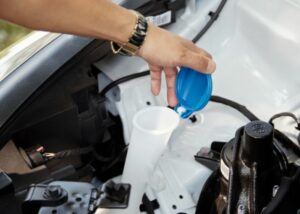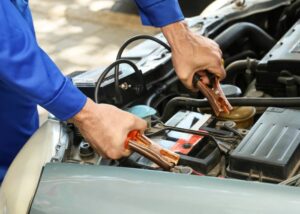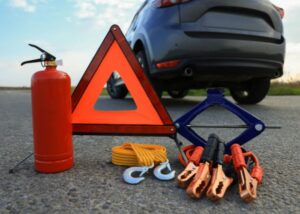Some vehicle preparation tips for this holiday season. The holiday season is a time for road trips, family visits, and adventures, but before you hit the road, it’s crucial to ensure your vehicle is in top shape. A well-prepared vehicle not only guarantees a smooth journey but also ensures the safety of you and your loved ones. At ASCC Spares, we understand the importance of vehicle readiness, and we’ve put together a comprehensive guide to help you prepare your car for the holiday season.
1. Start with a Comprehensive Vehicle Preparation Inspection

Before embarking on your holiday journey, take your vehicle for a thorough inspection. Whether you perform the checks yourself or visit a trusted mechanic, here’s what to focus on:
- Tires: Check the tread depth, inflation pressure, and look for any visible damage. Don’t forget to inspect the spare tire.
- Brakes: Ensure your brake pads and rotors are in good condition. Squeaking or grinding noises are a sign of wear.
- Lights: Test all lights, including headlights, taillights, indicators, and brake lights, for proper functionality.
- Wipers: Replace worn-out wiper blades to ensure clear visibility during rainy or dusty conditions.
A proactive inspection can help identify potential issues before they become bigger problems on the road.
2. Check Fluid Levels and Replace if Necessary

Fluids are the lifeblood of your vehicle, and maintaining optimal levels is crucial for performance. Here’s a checklist of essential fluids:
- Engine Oil: Ensure the oil level is within the recommended range and replace it if it’s due for a change.
- Coolant: Check for adequate coolant levels and look for leaks in the radiator or hoses.
- Transmission Fluid: Low transmission fluid can cause shifting issues. Top up or replace as needed.
- Brake Fluid: Ensure the fluid is at the proper level to maintain braking efficiency.
- Windshield Washer Fluid: Fill up the reservoir with washer fluid to keep your windshield clean.
If you’re unsure about the condition of these fluids, consult your owner’s manual or a professional mechanic.
3. Test Your Battery

The last thing you want is a dead battery when you’re far from home. Here’s how to ensure your battery is in good condition:
- Check Voltage: Use a multimeter to test the battery’s voltage. A fully charged battery should read around 12.6 volts.
- Inspect Terminals: Look for corrosion on the terminals and clean them with a baking soda solution if necessary.
- Load Test: A load test can reveal the battery’s ability to hold a charge under stress. Most auto shops can perform this test for you.
If your battery is more than three years old or shows signs of weakness, consider replacing it before your trip.
4. Inspect Belts and Hoses

Belts and hoses play a critical role in your vehicle’s operation. Worn or damaged components can lead to breakdowns, so inspect them carefully:
- Belts: Look for cracks, fraying, or glazing on the belts. A squealing noise might indicate a loose or worn belt.
- Hoses: Check for leaks, bulges, or cracks in the hoses. Ensure all connections are secure.
Replace any damaged belts or hoses to avoid issues during your journey.
5. Pack a Vehicle Emergency Kit

Even with thorough preparation, emergencies can happen. Equip your car with an emergency kit that includes:
- Jumper cables or a portable jump starter
- A spare tire, jack, and lug wrench
- Flashlight with extra batteries
- Basic tools (screwdrivers, pliers, etc.)
- First aid kit
- Reflective triangles or road flares
- Blankets, water, and non-perishable snacks
An emergency kit can make all the difference in unexpected situations.
6. Optimize Your Tires for the Trip

Your tires are the only part of your vehicle that touches the road, making them vital for safety and performance. Here’s what to do:
- Rotate Tires: Rotating your tires ensures even wear and prolongs their lifespan.
- Adjust Pressure: Inflate your tires to the manufacturer-recommended pressure, found in your owner’s manual or on the driver’s side door jamb.
- Check Alignment: If your car pulls to one side or the steering feels off, have your alignment checked before the trip.
Properly maintained tires enhance fuel efficiency, handling, and overall safety.
7. Inspect Your Suspension

Holiday travel often involves carrying extra passengers and luggage, which can strain your suspension. Test for:
- Uneven Wear: Look for uneven wear patterns on your tires, which could indicate suspension issues.
- Shocks and Struts: If your vehicle bounces excessively after hitting a bump, it may be time to replace the shocks or struts.
A well-functioning suspension ensures a comfortable ride and better control of your vehicle.
8. Ensure Your Air Conditioning and Heating Work
Comfort is key during long drives, especially in extreme weather conditions. Test your air conditioning and heating systems to ensure they’re working efficiently. If you notice weak airflow, strange noises, or unpleasant odors, have the system inspected by a professional.
9. Prepare for Luggage and Load Distribution
If you’re traveling with heavy luggage or equipment, improper loading can affect your vehicle’s balance and handling. Follow these tips:
- Distribute weight evenly to maintain stability.
- Avoid overloading your car, as it can strain the suspension and brakes.
- Use roof racks or cargo carriers for bulky items, ensuring they’re securely fastened.
Proper load management improves safety and fuel efficiency.
10. Check Roadside Assistance Coverage
Before hitting the road, confirm your roadside assistance coverage. Many auto insurance providers offer this service, which can include towing, flat tire changes, and lockout assistance. Having access to reliable roadside help can give you peace of mind during your journey.
11. Plan Your Route and Drive Smart

The holiday season often means busy roads and unpredictable weather. To ensure a safe and stress-free trip:
- Plan your route in advance and check for road closures or construction.
- Use GPS or a navigation app for real-time traffic updates.
- Avoid peak travel times to reduce congestion.
- Drive defensively and maintain safe following distances.
Smart planning helps you reach your destination safely and on time.
12. Stock Up on Spare Parts
Carrying a few spare parts can save you from delays in case of minor issues. At ASCC Spares, we recommend keeping the following on hand:
- Spare fuses
- Extra bulbs for headlights and taillights
- Serpentine belts
- Wiper blades
Our wide range of high-quality, affordable spare parts ensures you’re prepared for anything the road throws your way.
13. Perform a Final Pre-Trip Check
Before you embark on your holiday journey, perform a final check of the following:
- All lights and indicators
- Tire pressure and condition
- Fluid levels and leaks
- Emergency kit contents
Taking these last-minute precautions ensures your vehicle is ready for the road.
Conclusion
Preparing your vehicle for the holiday season is essential for a safe, stress-free journey. By following these steps, you can reduce the risk of breakdowns and ensure a comfortable ride for everyone. At ASCC Spares, we’re here to support you with top-quality spare parts and expert advice to keep your car running smoothly.
If you need assistance or want to stock up on spare parts before your trip, visit our store or contact us today. Drive safely, and happy holidays from all of us at ASCC Spares!

